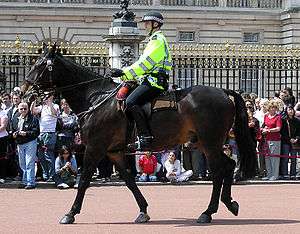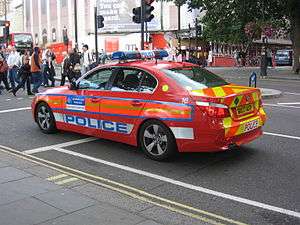Organisation and structure of the Metropolitan Police Service
The Metropolitan Police Service of Greater London is organised into four main directorates, each with differing responsibilities. These are Frontline Policing (formally Territorial Policing), Met Operations (formerly Specialist Crime & Operations), Specialist Operations and six civilian staffed support departments under the umbrella of Met Headquarters.[1] Each is overseen by an Assistant Commissioner, or in the case of a support department a director of police staff which is the equivalent civilian grade.

The Management Board, responsible for the strategic direction of the MPS is composed of the senior police leadership including the Commissioner, Deputy Commissioner, the four Assistant Commissioners (for Met Operations, Frontline Policing, Specialist Operations and Professionalism) and five directors.[2]
Leadership
The senior leadership rank-holders of the MPS currently are:[3]
- Commissioner of Police of the Metropolis – Dame Cressida Dick DBE, QPM[4]
- Deputy Commissioner of Police of the Metropolis – Sir Stephen House QPM
- Assistant Commissioner Mark Simmons (responsible for Frontline Policing)
- Assistant Commissioner Neil Basu (responsible for Specialist Operations)
- Assistant Commissioner Nick Ephgrave (responsible for Met Operations)
- Assistant Commissioner Helen Ball (responsible for Professionalism)
- Chief of Corporate Services Robin Wilkinson
- Director of Digital & Technology Angus McCallum
- Director of Commercial & Finance Lynda McMullan
- Director of Media & Communication James Helm
- Director of Legal Services Steven Bramley
- Director of Human Resources Clare Davies
- Director of Strategy, Insight & Governance Roisha Hughes
- Director of Transformation Peter Fox
The highest rank in the MPS is that of the Commissioner, the operational leader; however the MPS is accountable to the Mayor's Office for Policing and Crime on a pan-London basis and the Home Secretary on a national policing basis.
Appointments to the most senior ranks of Assistant Commissioner and above are made in consultation with the Mayor of London and the Home Secretary, with the appointment of the Deputy Commissioner and Commissioner being formally made by Her Majesty The Queen.[5]
Frontline Policing
The Frontline Policing Directorate, formerly known as Territorial Policing, is commanded by Assistant Commissioner Mark Simmons, who is responsible for providing the day-to-day local policing of Greater London, the police area defined in legislation as the Metropolitan Police District.
Basic Command Units
Until 2018 the MPD was divided into 32 Borough Operational Command Units (BOCUs); with each London borough assigned a BOCU.[6] Each BOCU was commanded by a Chief Superintendent. In early 2018 it was announced that there would be a radical shake up of local policing in London, largely due to police funding constraints. Over the following 12 months all BOCUs would be merged with others to form 12 Basic Command Units (BCUs). This followed a trial of two 'pathfinder' BCUs, Central North BCU consisting of the old Islington BOCU with Camden BOCU and the East Area BCU consisting of the old Barking & Dagenham BOCU, Havering BOCU and Redbridge BOCU.[7]
Each BCU are provided with:
- Emergency Response Team (ERT): Provides the majority of the physical responses to 999 or 101 calls, primarily investigates volume crime
- Local Resolution Team (LRT): Provides remote investigation and resolution work for non-crime incidents or incidents not requiring an immediate physical response
- Criminal Investigation Department (CID): Detectives investigate more serious and complex crimes beyond the scope of ERT's
- Safer Neighbourhood Teams (SNTs): Made up of uniformed officers and PCSOs who are responsible for local long term community interaction and problem solving.
- Telephone and Digital Investigation Unit (TDIU): Provides initial over-the-phone investigation of crime; it is either resolved or passed on to the other teams for further investigation
The 12 BCU structure consists of the following boroughs:
- Central West BCU (AW) – Hammersmith and Fulham, Kensington and Chelsea, Westminster
- South West BCU (SW) – Kingston, Merton, Richmond, Wandsworth
- South BCU (SN) – Bromley, Croydon, Sutton
- South East BCU (SE) – Bexley, Greenwich, Lewisham
- East BCU (EA) – Barking and Dagenham, Havering, Redbridge
- West BCU (WA) – Ealing, Hillingdon, Hounslow
- Central South BCU (AS) – Lambeth, Southwark
- North BCU (NA) – Enfield, Haringey
- Central East BCU (CE) – Hackney, Tower Hamlets
- Central North BCU (CN) Camden, Islington
- North West BCU (NW) – Barnet, Brent, Harrow
- North East BCU (NE) – Newham, Waltham Forest
There has been significant concern raised in various quarters over these changes.[8][9][10]
The Royal Parks Operational Command Unit also comes under the remit of the Assistant Commissioner Frontline Policing.
Roads and Transport Policing Command
Incorporates the previous Safer Transport Command and Traffic Unit.
The Roads and Transport Policing Command oversees policing on London's road and transport network. It works in partnership with, and is significantly funded by, Transport for London to tackle transport related crime, improve road safety, reduce the number of traffic related injuries and deaths on London's roads.[11]
Met Operations
Met Operations, also known as Met Ops, is one of the four business groups which forms the Metropolitan Police Service. It was created during the 2018–19 restructuring of the service, amalgamating much of its functions from the previous Specialist Crime & Operations Directorate. The group is currently led by Assistant Commissioner Nick Ephgrave.
It consists of several branches:
- Met Ops Chief Officer Team (MO1)
- Met Intelligence (MO2)
- Covert Policing (MO3)
- Forensic Services (MO4)
- Covert Governance (MO5)
- Public Order Planning (MO6)
- Taskforce (MO7)
- Roads and Transport Policing Command (MO8)
- Met Detention (MO9)
- Met Prosecutions (MO10)
- Operational Support Services (MO11)
- MetCC (MO12)
- Specialist Firearms Command (MO19)
- Known by non-police units as SCO19 still (previously SO19 then CO19) is responsible for providing a firearms-response capability, assisting the rest of the service, which is normally unarmed. Within the media, it is occasionally compared to the Special Weapons and Tactics units of the United States, being seen as London's equivalent.
Specialist Operations
Specialist Operations (SO) is a directorate of the Metropolitan Police Service, responsible for providing specialist policing capabilities. Until Sir Kenneth Newman's restructuring of the Metropolitan Police, SO comprised twenty units, but after the restructuring most of them were absorbed by Central Operations (now Met Operations).
SO is currently headed by Assistant Commissioner Neil Basu, with two Deputy Assistant Commissioners and a further three Commanders.[12]

SO is currently organised into three Commands:
Protection Command
Split into the following specialist operational areas:
- Parliamentary and Diplomatic Protection (PaDP)
- Royalist and Specialist Protection (RASP)(RaSP)
- Aviation Policing (SOAP)
Counter Terrorism Command (SO15)
Formed by the merger of Special Branch and the Anti-Terrorist Branch. The priority of this command is to keep the public safe and to ensure that London remains a hostile environment for terrorists. Their responsibilities include: bringing to justice anyone engaged in terrorism or related offences, preventing and disrupting terrorist activity, gathering and exploiting intelligence on terrorism and extremism in London.
Security Command
Security Command is currently headed by Commander Simon Bray.
- Protective Security (SO20) – ensures that there are adequate protective security arrangements in place for major events, crowded places, iconic sites and that key utilities and sites where hazardous substances are located are securely protected.
Met Headquarters
- Human Resources
- Commercial and Finance
- Portfolio and Planning
- Legal Services
- Media and Communications
- Digital Policing
- Transformation
- Shared Support Services[13]
Police officer strength by rank
The following table gives the police strength in the MPS by rank.
| Date | Constables | Sergeants | Inspectors | Ch Inspectors | Superintendents | Ch Superintendents | ACPO rank | Total |
|---|---|---|---|---|---|---|---|---|
| 31 March 2010[14] | 24,788 | 6,069 | 1,695 | 475 | 217 | 86 | 37 | 33,367 |
| 31 March 2011[15] | 24,595 | 5,583 | 1,503 | 448 | 196 | 81 | 34 | 32,441 |
| 31 March 2012[16] | 24,328 | 5,494 | 1,641 | 362 | 201 | 79 | 35 | 32,140 |
| 31 March 2013[17] | 23,283 | 4,982 | 1,442 | 452 | 157 | 72 | 31 | 30,398 |
| 31 March 2014[18] | 24,420 | 4,644 | 1,235 | 422 | 109 | 73 | 29 | 30,932 |
| 31 March 2015[19] | 25,851 | 4,321 | 1,103 | 333 | 165 | 76 | 29 | 31,877 |
| 31 March 2016[20] | 25,787 | 4,548 | 1,261 | 279 | 159 | 62 | 29 | 32,125 |
| 31 March 2018[21] | 24,149 | 4,456 | 1,234 | 275 | 197 | 46 | 34 | 30,390 |
Total workforce
The following table gives the workforce numbers in the MPS.
| Date | Staff members | PCSOs | Police officers | Total | Special constables |
|---|---|---|---|---|---|
| 31 March 2010 | 14,179 | 4,645 | 33,367 | 52,191 | 3,177 |
| 31 March 2011 | 13,688 | 4,009 | 32,441 | 50,138 | 4,944 |
| 31 March 2012 | 12,751 | 2,760 | 32,140 | 47,651 | 5,752 |
| 31 March 2013 | 12,328 | 2,684 | 30,398 | 45,410 | 5,303 |
| 31 March 2014 | 11,303 | 2,087 | 30,932 | 44,322 | 4,587 |
| 31 March 2015 | 10,599 | 1,787 | 31,877 | 44,263 | 3,659 |
| 31 March 2016 | 9,521 | 1,626 | 32,125 | 43,272 | 3,271 |
Film Unit
The MPS Film Unit was launched in 2006[22] and manages the commercial filming schedule across London on behalf of local councils and major production companies including MGM as well as producers for various film and TV commercials. The Film Unit is based in Southwark and is maintained by current serving police officers. The Film Unit provides operational officers to ensure security for film companies and the general public. It is part of the Film London Partnership which is supported by the Department of Culture, Media and Sport, the Mayor of London and Film London.[23]
| Recent film productions requiring the assistance of the Metropolitan Police Service Film Unit | |||
|---|---|---|---|
| Films | Television | ||
|
|||
References
- "Home – The Met". content.met.police.uk. Retrieved 30 September 2018.
- "Home – The Met". content.met.police.uk. Retrieved 30 September 2018.
- "Executive Structure". Metropolitan Police Service. January 2019. Archived from the original on 29 March 2019.
- "Cressida Dick makes history". The Daily Telegraph. Retrieved 14 March 2017.
- "Home Office – police". Government of the United Kingdom. Archived from the original on 10 January 2012. Retrieved 31 March 2012.
- "Metropolitan Police Service – Organisational Structure". Met.police.uk. Retrieved 29 May 2009.
- "Met announces changes to local policing". Mynewsdesk. Retrieved 5 March 2018.
- "Nearly 1,500 people sign petition to 'save' Sutton police after controversial merger plans". News Shopper. Retrieved 5 March 2018.
- "Borough-based policing commands to disappear in London-wide cost cutting plan | Eastlondonlines". Eastlondonlines. 21 February 2018. Retrieved 5 March 2018.
- "Met to merge all policing boroughs". BBC News. 12 February 2018. Retrieved 5 March 2018.
- "Roads and Transport Policing Command". met.police.uk. Retrieved 6 December 2014.
- https://beta.met.police.uk/globalassets/downloads/about-the-met/met_organisational_chart_february2017.pdf
- "MPS Executive Structure". met.police.uk. Retrieved 16 August 2014.
- http://www.homeoffice.gov.uk/publications/science-research-statistics/research-statistics/police-research/hosb1410/hosb1410?view=Binary
- http://www.homeoffice.gov.uk/publications/science-research-statistics/research-statistics/police-research/hosb1311/hosb1311?view=Binary
- http://www.homeoffice.gov.uk/publications/science-research-statistics/research-statistics/police-research/hosb0912/hosb0912?view=Binary
- Home Office (18 July 2013). Tables for 'Police workforce, England and Wales, 31 March 2013'.
- Home Office (17 July 2014). Tables for 'Police workforce, England and Wales, 31 March 2014'.
- Home Office (16 July 2015). Police workforce, England and Wales: 31 March 2015: data tables.
- Home Office (21 July 2016). Police workforce, England and Wales, 31 March 2016. See data tables. Retrieved 6 November 2016.
- "Police workforce, England and Wales: 31 March 2018". Government of the United Kingdom. Retrieved 11 May 2019.
- http://content.met.police.uk/Site/mpsfilmunit
- Policy for Filming in London, Metropolitan Police Service. Retrieved 25 October 2012
